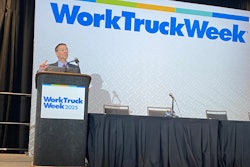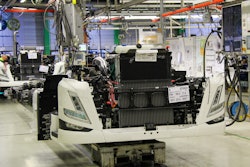President Donald Trump on Tuesday unfurled new tariffs that he believes will boost American manufacturing. Actual American manufacturers, however, don't see that bring the most likely end result.
National Association of Manufacturers President and CEO Jay Timmons said the United States-Mexico-Canada Agreement, which came about during President Trump's first term, has strengthened North American supply chains and bolstered economic power across the region, boosting jobs, wages and investments in the States.
“Thanks to this agreement, one-third of critical U.S. manufacturing inputs now come from Canada or Mexico, rather than from competitors like China that often engage in unfair trade practices," he said.
With tax reforms left on the cutting room floor by the last Congress and the Biden administration, Timmons said manufacturers are already facing mounting cost pressures.
"A 25% tariff on Canada and Mexico threatens to upend the very supply chains that have made U.S. manufacturing more competitive globally. The ripple effects will be severe, particularly for small and medium-sized manufacturers that lack the flexibility and capital to rapidly find alternative suppliers or absorb skyrocketing energy costs," he said. "These businesses — employing millions of American workers — will face significant disruptions. Ultimately, manufacturers will bear the brunt of these tariffs, undermining our ability to sell our products at a competitive price and putting American jobs at risk."
President Trump on Wednesday granted a one-month exemption to U.S. automakers on imports from Mexico and Canada, and Thursday postponed 25% tariffs on most goods from Mexico for a month.
White House press secretary Karoline Leavitt noted Trump told leaders of Detroit's Big Three auto companies they should move production to the U.S from Canada and Mexico – not at all a quick process, delaying what could be dire consequences for car and commercial truck manufacturers, the fleets that haul them and the motor carriers that buy them.
Jason Miller, interim chairperson and professor of supply chain management at the Eli Broad College of Business at Michigan State University, who was a guest on a CCJ hosted webinar last month, noted that the move of manufacturing across the border could take "months to years, [before] we'd start to see production shifting potentially take place."
Miller noted one of his "greatest fears" with the start of tariffs with Mexico and Canada was the U.S. motor vehicle and parts industry was already showing troubling signs over the past several months, "which will now be made much worse," he said.
Industrial production of motor vehicles and parts, which captures physical unit output for domestic plants, saw a sharp downward slide since the first half of 2024, due in large part to the accumulation of too much inventory at dealer lots. Payrolls had been averaging about 1.02 million from late 2022 through mid-2024, but payrolls as of January slid to 995.8 thousand. "In other words, payrolls have dropped by 25,000 to 30,000," Miller said. "Again, this is bad sign."
When factoring for sharp increases in the price of vehicles that are domestically made due to foreign-sourced content, "you can’t help being discouraged that we will see further declines in vehicle sales, which will cause more layoffs," Miller said.
Indeed, a sticker shock to some degree seems inevitable 30-plus days from now.
American Trucking Associations President and CEO Chris Spear estimated tariffs in Mexico and Canada could add an estimated $35,000 cost to a Class 8 tractor, "amounting to a $2 billion annual tax and putting new equipment out of reach for small carriers."
John Mies, corporate communications at Mack Trucks and Volvo Trucks North America told CCJ recently that quantifying the tariffs' impact on commercial truck cost is difficult right now, but added "any tariffs will increase our costs, and we expect the industry as a whole to pass the increased costs on to customers."
OEMs may also face supply chain challenges due to tariffs and counter-tariffs, leading to longer lead times and potential shortages of critical components, according to Dan Moyer, senior analyst, commercial vehicles, at FTR Transportation Intelligence, and agreed that rising costs for raw materials and components will increase vehicle prices.
"Trumps’ tariffs will cause massive disruptions to the production of motor vehicles and parts in the USA," Miller said. "While we will see some production shift to the U.S. due to tariffs, I expect we are in for a very rough year for this industry if these tariffs on Canada and Mexico stay into effect for any length of time.
Pre-tariff stocking
Inventory levels shot up in February as suppliers raced to stock up ahead of possible tariffs from the current administration, according to researchers at Florida Atlantic University and four other schools. The February Logistics Manager’s Index (LMI) reads in at 62.8, up (+0.8) from the January reading. A score above 50 indicates that the logistics industry is expanding, while a score below 50 indicates that the industry is shrinking. This is the fastest reading of expansion in the overall index since June 2022. All eight metrics used to calculate the score saw an increase.
Steven Carnovale, Ph.D., associate professor of supply chain management in FAU’s information technology and operations management department, noted the rapid stockpiling of inventories represents a shift back to the COVID style "just-in-case" inventory policies and "puts enormous pressure on the warehousing segment, which has been under intense price pressure as of late."
In response to rising inventory levels, inventory cost and warehousing prices also increased in February’s reading to 77.3 and 77, respectively – their highest level of expansion in several years as the supply chains struggle to keep up with the influx of inventory that came in to work around potential tariffs.
“The uncertainty associated with the how, where and when of tariffs and other trade related policy is having a demonstrable effect in how supply chains adapt in real time,” Carnovale said. “We are seeing signals of massive stockpiling effects and a race for resources globally, which is driving heightened costs in warehousing, transportation and inventories. This puts immense pressure on supply chains globally.”











